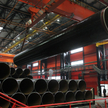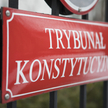He added that it is not just about the most technically advanced solutions. As he noticed, if it had been not for public pressure on the major EU countries (primarily France and Germany), there would have been much less support for Ukraine. Europe has changed, he concluded.
The role of civil society was also discussed by Thomas Tighe from Direct Relief. As he noted, the scale of the humanitarian crisis caused by the war and the displacement of more than 8 million people is far greater than any humanitarian crisis in years. We have gained a lot of experience in dealing with humanitarian and refugee crises over the years, e.g. in Sudan or Eritrea. But what happened in Poland was amazing, he assessed.
Many thanks to Poland and the Poles for their support for refugees and Ukraine. The leadership that Poland and the Poles showed was extremely important. I mean personal leadership – people. As it turned out, people, ordinary people, organised themselves faster than institutions and governments, he noted. As he said, we should remember that the crisis is ongoing and sometimes requires difficult decisions.
“Guns and butter” is one of the key metaphors during massive crises. From the point of view of medical care, crises have one thing in common. A very strong increase in the need for care and protection coincides with a decreased ability to provide it, he noted. As he pointed out, a crisis of this magnitude causes a ripple effect on very different levels: economic, social, and other. This crisis also saw a rapid mobilisation of private companies in terms of support for Ukraine, he noted. During the event in Karpacz, CORE and Direct Relief received NGO awards for helping Ukraine.
What will the future bring? During the debate, there was a question about the economic context of the conflict and the challenges of Ukraine reconstruction after the war. This is a task for the future. It is easier than winning the war. Ukraine must win the war. Otherwise, the discussion on reconstruction is pointless, noted Janez Jansa.
Another topic discussed was the direction Europe will take in the coming years, including in the context of the changes brought about by the war. The former Prime Minister of Slovenia said that it is unlikely that a European federation would be established in the near and foreseeable future. The greater the pressure to establish it, especially from Germany, the greater the risk that EU will break from within. There will never be a consensus among EU countries when it comes to establishing a federation. Never, he said.


























